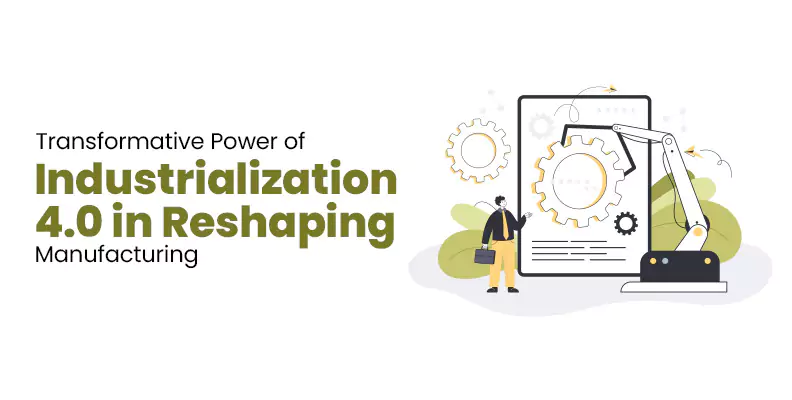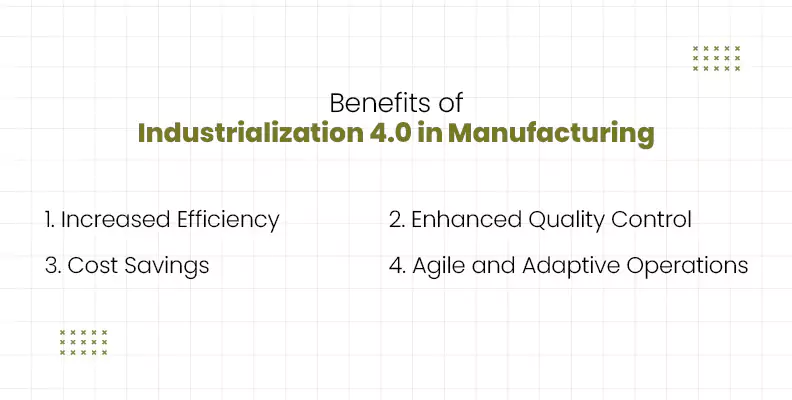Loading.....
Transformative Power of Industrialization 4.0 in Reshaping Manufacturing

In the ever-evolving landscape of manufacturing, Industrialization 4.0 stands as a revolutionary force, propelling industries into a new era of efficiency, connectivity, and innovation. This paradigm shift, driven by advanced technologies and smart systems, has ushered in a transformative wave that promises to reshape the way we perceive and engage in manufacturing processes. In this blog post, we'll delve into the intricacies of Industrialization 4.0, exploring its impact on the manufacturing sector, the key technologies involved, and the benefits it brings to businesses.
What Is Industrialization 4.0 or 4IR
Industrialization 4.0, the fourth industrial revolution, represents a fusion of digital, physical, and biological systems. In the manufacturing realm, it signifies the integration of smart technologies into traditional industrial processes. This convergence aims to create intelligent, interconnected systems capable of making informed decisions, optimizing operations, and enhancing overall productivity.
Benefits of Industrialization 4.0 in Manufacturing

- Increased Efficiency
- Enhanced Quality Control
- Cost Savings
- Agile and Adaptive Operations
Industry 4.0 Technologies
- Internet of Things (IoT): The IoT plays a pivotal role in Industrialization 4.0 by connecting devices and machines, and facilitating real-time data exchange. This connectivity enables manufacturers to monitor, analyze, and optimize processes, leading to improved efficiency and reduced downtime.
- Big Data and Analytics: Harnessing the power of big data allows manufacturers to gain valuable insights into their operations. Analyzing large datasets helps in identifying patterns, predicting maintenance needs, and making data-driven decisions, ultimately enhancing overall performance.
- Artificial Intelligence (AI) and Machine Learning (ML): AI and ML algorithms empower machines to learn from data, adapt to changing conditions, and make intelligent decisions. In manufacturing, these technologies optimize production schedules, predict equipment failures, and contribute to continuous process improvement.
- Robotics and Automation: Industrial robots and automation systems are becoming increasingly sophisticated, taking over repetitive tasks and allowing human workers to focus on more complex and creative aspects of production. This results in increased efficiency, precision, and safety.
Integration Technology Without Downtime Downtime
Industry 4.0 has emerged as a transformative force, revolutionizing the way industries operate. However, the challenge lies in seamlessly incorporating these advancements without causing downtime.
Here are some practical strategies to integrate Industry 4.0 into manufacturing processes without disrupting operations.
-
Comprehensive Planning and Assessment
Before diving into the integration of Industry 4.0 technologies, a thorough assessment of the current manufacturing processes is crucial. Identify areas that can benefit from automation, artificial intelligence (AI), and data analytics. A well-thought-out plan ensures a smooth transition without compromising productivity.
-
Phased Implementation
Attempting a complete overhaul of manufacturing processes at once can lead to significant downtime. Instead, opt for a phased implementation approach. Start with pilot projects in specific departments or production lines to test and refine the new technologies. This minimizes disruptions and allows for continuous operation.
-
Employee Training and Involvement
The success of Industry 4.0 integration hinges on the proficiency of the workforce. Invest in comprehensive training programs to familiarize employees with the new technologies. Create a culture that encourages continuous learning and adaptation, ensuring that employees actively participate in the transformation process.
-
Interoperability of Systems
Ensure that the different components of Industry 4.0, such as IoT devices, robotics, and data analytics tools, can seamlessly communicate with each other. This interoperability facilitates a smooth exchange of information, preventing bottlenecks and minimizing the risk of system failures that could lead to downtime.
-
Cybersecurity Measures
As manufacturing processes become more connected, the importance of robust cybersecurity measures cannot be overstated. Implementing state-of-the-art security protocols protects against cyber threats, ensuring the continuous operation of the system without compromising sensitive data or risking downtime due to security breaches.
-
Predictive Maintenance
One of the key benefits of Industry 4.0 is the ability to predict and prevent equipment failures through advanced analytics. Implement predictive maintenance strategies to identify potential issues before they cause downtime. This approach not only ensures continuous operation but also extends the lifespan of machinery.
-
Cloud-Based Solutions
Implementing Industry 4.0 is an ongoing process. Regularly monitor and analyze the performance of the integrated technologies to identify areas for improvement. Continuous optimization ensures that the manufacturing system remains efficient and adapts to evolving industry standards without causing downtime.
-
Continuous Monitoring and Optimization
Utilizing cloud-based solutions for data storage and processing can significantly enhance flexibility and accessibility. Cloud platforms enable real-time collaboration and data analysis, allowing manufacturing processes to continue without interruption, even if on-site systems experience temporary issues.
Conclusion
Embracing Industrialization 4.0 in manufacturing is not just a technological leap; it's a strategic imperative for businesses looking to thrive in the modern era. The amalgamation of IoT, big data, AI, and automation empowers manufacturers to create intelligent, interconnected ecosystems that drive efficiency, enhance quality, and pave the way for sustained success. As we navigate the future of manufacturing, Industrialization 4.0 stands as the beacon guiding the way to a more connected, intelligent, and prosperous industrial landscape.
 Back to blog
Back to blog












